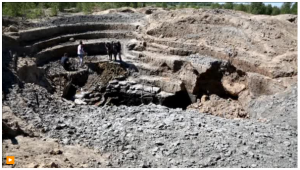
(Reuters) A group of men wearing mudded khaki pants and rubber boots are digging into hard clay with their shovels at the bottom of a pit in Russia’s Kaliningrad region some 1200 km (750 miles) west of Moscow.
The men are searching for amber – 50-million-year-old fossilized tree resin. Kaliningrad region, enclaved between Lithuania and Poland on the Baltic Sea shore, is home for 90 percent of world’s amber deposits and some of them lay just 3-4 meters below the ground.
Translucent amber which looks as if it was sunlit from inside is dubbed the ‘Baltic gold’; it can actually cost more than its weight in gold.
The world prices for amber which is used in jewelry, medical drugs, perfumes as well as in religious artifacts, have gone up almost tenfold over the last decade.
Raw amber does not look precious, but a hard-working digger can earn up to 200,000 rubles (about $3,800 U.S. dollars) a month if he is lucky. It is almost ten times more than an average salary in the region which belonged to Germany before 1945.
“This is easy money. We dig here. I came not long ago. I’ve been digging for about a month here,” said one of the diggers, 23-year old Sergei Khripunov who is officially unemployed. When asked how much he had earned in a month, he answered that it was enough to buy himself a modest car.
Digging amber is illegal in Russia and the right to extract precious stones varying from milky-white – to yellow – to black in colour belongs to the government. The only outlet that is permitted to sell raw amber to local craftsmen and buyers from abroad is the state-owned Amber Factory. However, the quality of illegally extracted stones is usually better and they can be sold at the black market rate which 5-6 times higher.
Sergei said he would not take part in illegal digging if it could lead to criminal punishment. But for now diggers can only be fined for up to 5,000 rubles (about $95).
Amber digging is a lucrative business, but it also harms fragile ecosystems in Kaliningrad region. Losing competition to European farmers after the collapse of the Soviet Union lead most of local agricultural businesses to bankruptcy, and the majority of agricultural lands – birthplaces for raw amber – are abandoned.
Shovels of amber diggers destroy fertile soil layer and turn fields that used to give birth to crops into lifeless mud deserts with dig pits full of murky water that would take decades, or even centuries, for nature to recover.
“People have been digging here for 20 years already. I’ve been here since 1999. So everything was spoilt here before we came. I’ve been in this field for 15 years already. And where should I go?” another illegal digger Aleksei Mironenko said.
He claims to earn about 30,000 rubles (about $530) per month without much effort and says that economic crisis in Russia and growing hunger for amber abroad, especially in China, makes illegal digging a worthy risk.
A police ATV can show up any minute at a dig site and catch the diggers red-handed but this does not scare off those hungry for easy income.
Things are actually getting better, an officer from Kaliningrad region’s Department of Economy Security of Russian Internal Ministry, Andrei Voyevodin, says. Back in the 1990s, diggers used excavators and motor-pumps to extract amber with much more damaging effect for the nature.
Recent changes in the country’s legislation gave police a right to seize illegal digger’s instruments and machinery, but more should be done to stop them for good, according to Voyevodin.
“I would introduce criminal punishment for illegal extraction of amber,” he says adding that he believes fines should reach 30,000-40,000 rubles ($530-750)
“As you can see the damage caused by these diggers is massive,” – he adds. “Nothing will grow on this land after them and it will be very hard to restore it. So they should also be ordered to pay for the restoration of this fertile soil layer.”
Most of the lands targeted by diggers are private, but owners lack resources to cultivate or even guard them. But recultivating the field after it was shoveled through by amber hunters would cost even more.
Sergei, Alexei and other illegal diggers were detained by the police special forces, but they are most likely to be back in the field as soon as the very next day, and they are calling fines a minor tax on their hefty income.
Another obstacle for the authorities in fighting amber hunters is that the Russian law does not provide punishment for re-selling it or buying illegally.
Kaliningrad officials say the worldwide amber industry turnover reaches a billion U.S. dollars a year while the region only earns less then $24,5 million. Illegal amber slips through the borders as it is smuggled to EU and then sold all over the world.







